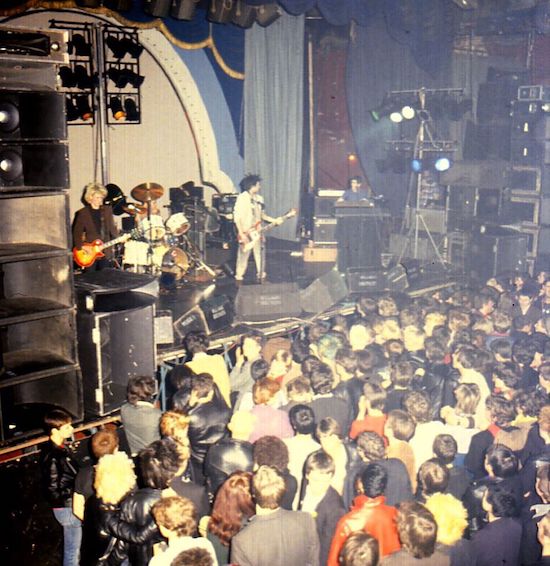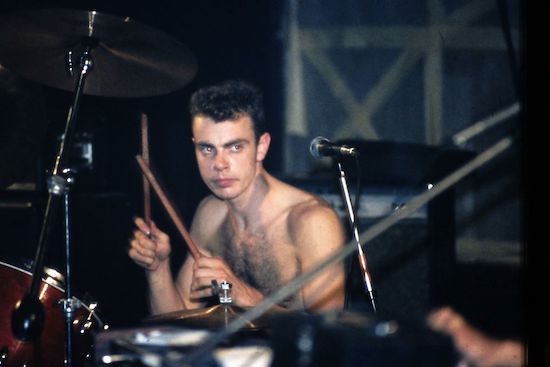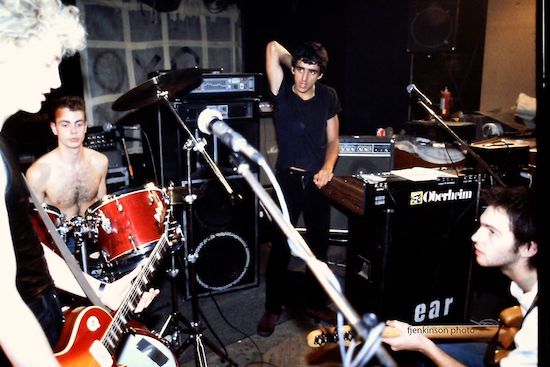(Left to right) Geordie Walker, Big Paul Ferguson, Jaz Coleman and Youth at Ear rehearsal rooms. All photos by Frank Jenkinson
MARQUEE STUDIOS
August 1980, London, UK
PHIL HARDING
(engineer of Killing Joke’s self-titled debut album)
I started at The Marquee Studios in 1973 as a tea boy/tape jockey/runner/assistant engineer. It was an unofficial apprenticeship where you learned on the job, observed what the engineer on the session was doing (when you had time) and hustled the management for spare available time to practise engineering yourself when possible – often weekends – often with the other assistants, recording friends’ bands etc. There was very little official training, but, after three or four years, assistants would be let loose on paying clients to see how we got on.
After spending all of those years training, the norm was to see a producer alongside the engineer in the control with the band in the studio recording area, communicating via a talk-back system to the musician’s headphones.
But the punk revolution brought with it the rebellious attitude from bands that they did not want to work with old/established corporate-rock producers. In fact, initially, many punk bands refused to work with producers and that was the case with The Clash on the sessions I worked on with them. I mixed ‘(White Man) in Hammersmith Palais’ with Joe and Mick in the room but no producer. Paul popped in at one point and wasn’t particularly happy with what he was hearing. That was an early indication to me of having no producer there and the problem that can cause between band members and their differing views.
I got on well with Mick and Joe and that led to a recording session where they came back into the Marquee to record four songs for the Black Market Clash mini-album. Those sessions really geared me up as an engineer to getting used to the idea of being on my own in the control room without a producer by my side – just an empty chair. It was very good practice for the Killing Joke sessions.
I was only ever the engineer for the [Killing Joke] album – the band were the producers and that was made clear from day one. The Killing Joke sessions were a baptism of fire because it wasn’t just a few tracks – it was a whole album. The label were very generous at the start of the sessions, bringing in a crates of beer and champagne on day one, which was very celebratory and set everyone off in a very good mood.
Playing together in the same room with good sight of each other was very important to the band. We had a good studio layout at the Marquee and were able to accommodate getting all four members seeing each other and enough separation of the amps and sounds for me to record everything with an acceptable, minimal spillage between instruments.
The control-room window looked out onto one end of the long, oblong studio recording space. So, we set up [Big] Paul [Ferguson, drummer] closest to the control room with him facing into the long studio. There were a few low-level acoustic screens around the drums, but Paul could still see over them to have contact with the other guys. [Martin] Youth [Glover, bass] was a third of the way along the studio to the right, with his bass amp in a booth and him sitting or standing outside of that and long lead to the amp. Geordie [Walker, guitar] was set up almost opposite Youth on the left-hand side of the studio (looking from Paul’s end). His amp was behind him with heavy acoustic panels around it to give as much separation as possible.

Paul Ferguson behind the kit during the making of the first album
Inevitably, there was some guitar spill onto the drum mics – especially the pair of Neumann ’87s at the far end of the room that were there to pick up drum ambience. Jaz [Coleman, vocals/keyboards] was then set up with his keyboard and a guide vocal (Shure ’58) mic in the middle of the studio, facing Paul, with Youth to his left and Geordie to his right.
Jaz’s keyboard was plugged into DI (direct injection) boxes for a stereo feed and I encouraged him not to sing too loudly.
Everyone had the same headphone balance, so that was tricky to get right, especially for Jaz to hear enough of his keyboard with no amp behind him. The great thing was, though, by taking one headphone slightly off, everyone could hear Paul because he thumped the drums so loudly! Geordie could hear a fair bit of his amp in the room behind him and Youth managed to cope. The whole album was recorded like that – almost like the band were live on stage or in a rehearsal room.
Drop-ins for mistakes or overdubs were fairly minimal. Paul’s drum takes were always brilliant, once he was happy with the control-room playback. Obviously, we would then record the lead vocals separately and Jaz got better at that as the album went on.
It was pretty chaotic – especially the playbacks in the control room after recording a take out in the studio. It would go something like this.
The band would come back into the control room, generally buzzing from having played a good take and everything sounding loud in their headphones, backed up by the physical noise of the drums and Geordie’s guitar amp in the studio.
I would therefore have to play back really loud on the main monitors for the band to get the kind of volume excitement they had just experienced in the studio.
Each band member, one at a time, would then appear in front of me from the other side of the mixing console and scream instructions at me, whilst the really loud playback was going on, generally demanding that their instrument be the loudest and heaviest-sounding in the balance. Especially Jaz, wanting more aggression and reverb added to his keyboard sounds.
When the tape stopped after the playback, generally everyone would congregate on the sofa at the back of the studio and say nothing about the balance – just whether or not to do another take or stick with what we had.
So it was very chaotic initially for me, but I soon got used to it. I would generally only comment on anything technically with regard to suggesting another take or not, usually based around how the drum performance sounded as we should generally drop-in and replace any bass/guitar or keyboard mistakes (there weren’t many).
I think it was around a month [to make], maybe less to record. Then there was a break after the first attempts at mixing.

One of the clutch of Lyceum gigs
We did hit a crisis point at the mixing stage because I suggested we should mix in the upstairs mixing room – Studio 2 – a much smaller room, designed for mixing. This was something the studio management encouraged – record downstairs, mix upstairs. Unfortunately, it didn’t work for the Killing Joke project. The room was too small for everyone to sit in comfortably, the lounge area was a bit too public as it was alongside the office with a lot of people passing by, which wasn’t good for the band’s privacy.
I thought the mixing was going okay, but I could tell the boys weren’t happy with the logistics or the sound of the room compared to what they had become used to in the larger downstairs studio and control room.
So, the project came to a grinding halt at that stage with the label cancelling the rest of the mixing sessions and suggesting the band wanted to mix elsewhere.
My feeling was that we should go back downstairs and mix in Studio 1, where the band were happy with the recording results, the more spacious control room and the sound of the speakers/acoustics there. I suggested to the studio management that we offer the label a free day to do an experimental mix downstairs to see if everyone felt happy about that. We managed to find a day of free studio time to offer that a week or so later. The band and the label graciously agreed to try it out. As I had hoped, it turned out really well. I can’t remember which song we mixed, probably ‘Requiem’, as that was planned as the first single. Everyone was happy to carry on like that and, to my relief, the label agreed to book the studio time to complete the mixing of the album in the downstairs Studio 1.
Geordie wasn’t keen on double-tracking or overdubbing guitars, but, when he did, it always sounded great to me. I noticed on the albums that followed, there was a lot more overdubbed guitar work and maybe the first album lacked that a bit. ‘Primitive’ is a great example of Geordie tracking his guitars and I like how that gives the track a better stereo balance and more power. Same goes for ‘Change’.

Jaz in "characteristic rant mode". Location unknown
Jaz was the strongest character at that time but the rest of the band didn’t let him get away with anything, so it balanced out quite well. Geordie and Paul were really great characters and masters of their instruments. They didn’t need to say much as their instruments did the talking for them and they were determined to get great recording results. Youth was a bit younger and less experienced. The rest of the band gave him a lot of encouragement and I think he improved as a musician as the album progressed. He was and still is easy to get on with and we had a good chat a few years ago at the MPG [Music Producers Guild] Awards ceremony. I also did a few mixes with Youth after he left the band and was starting his career as a producer.
I liked all of them and felt they were a well-matched unit of characters and musicians. I think it goes without saying that Geordie is now and was at that time an accomplished musician that knew exactly what his sound was and what he wanted to achieve.
The standout musician to me, though, was Paul. His ability to step back into the studio after a “relaxation” break or playback and play such powerful and tight drums really left an impression on me on how rock drummers need to play in the studio to achieve great results both creatively and technically. Jaz knew his limitations as a keyboard player but created some great parts and sounds that worked fantastically with the standard rock set-up of drums/bass and guitar. That’s not always an easy thing to achieve as a keyboard player and often his keyboard parts were the backbone and start point of the songs. Youth progressed into being a great bass player throughout the album, I think, and it’s a shame in many ways that he didn’t stay with the band longer, but it’s great to see the original line-up back together in recent times.
It was and still is annoying for engineers and producers like myself not to get credits and it can still happen. But, at the time, it was the norm for punk and post-punk bands not to credit engineers, studios and backroom staff. It was part of the attitude and rebellious punk revolution in the late Seventies/early Eighties. I wasn’t credited on the engineering I did for The Clash, either. To the best of my knowledge, this has never been rectified.
[On the debut being a landmark album] I think as much as anything it was the power and attitude of the band and the fact that we managed to capture some of the live raw power in the studio, achieved largely by not doing many overdubs and making sure the individual sounds and performances were as spot on as possible. The band were very much in control of all of that. How they were marketed by the record label was dictated by them as well.

Big Paul at Ear rehearsal rooms
YOUTH
We already knew what the arrangements were. There wasn’t that much experimentation. The first album was simply a matter of recording it. It was simply a matter of execution. Phil Harding. So unassuming. You never knew what was going on with him. He was just a total professional. He was like a doctor. But he handled us really well and allowed to do it the way we wanted to do it. But he would cover our arses technically and make sure it was recorded right.
GEORDIE
It was so easy in the beginning. A lot of that first album, we’d played that shit out live for nigh on a year and just walked in the studio and did it.
YOUTH
The Marquee was great because, five nights a week, we could just go down and watch the bands. There’d be Budgie one night, John Mayall, The Groundhogs. Me and Geordie loved that.
We’d recorded ‘Wardance’ twice. I think the best version we got was some John Peel session where we got it right. But trying to get that distorted vocal right, ugh. The album version came out the worst one. But then I go to America and meet all these hardcore bands and they are like: “That was the first record that allowed us to sing like that.” It was so influential and I was like: “Really?”
It’s a simple recipe in its essence. I essentially am Geordie’s seventh string. There are a few tracks where they are bass-line orientated and then Geordie is my seventh string, like ‘Change’. Geordie is a bloody great bass player. He was Grade 7 cello when he was a kid. So he knows his chops as a bass player.
Luckily, he’s a fan of my bass playing. But I had to fight to get my bass lines in because he’s so fucking good. If it didn’t have a bass line, I would just follow his guitar. I’d learned guitar before bass. I would just follow his hands. And then you put these tribal disco drums on it and some sort of moody synths and that’s it really.
We had a lot of pop sensibilities. On the first album, every song has a really pop chorus. I have to remind the band of that sometimes. Whenever I bring a new poppy chorus, they say, “ugh, it’s pop”, but so’s ‘Wardance’, so’s ‘Change’.
MIKE COLES
(sleeve designer)
[Using photographer Don McCullin’s image for the cover of the first album] EG, the label at the time, wrote to him and he said it was fine, so long as the band didn’t expect him to endorse the music. I suspect he thought it was just another bit of punk nonsense that would be dead and buried in a couple of years. Forty years on…
Killing Joke: A Prophecy Fulfilled by Chris Bryans is published by This Day In Music


